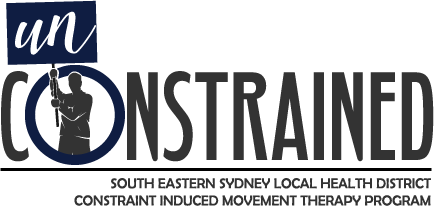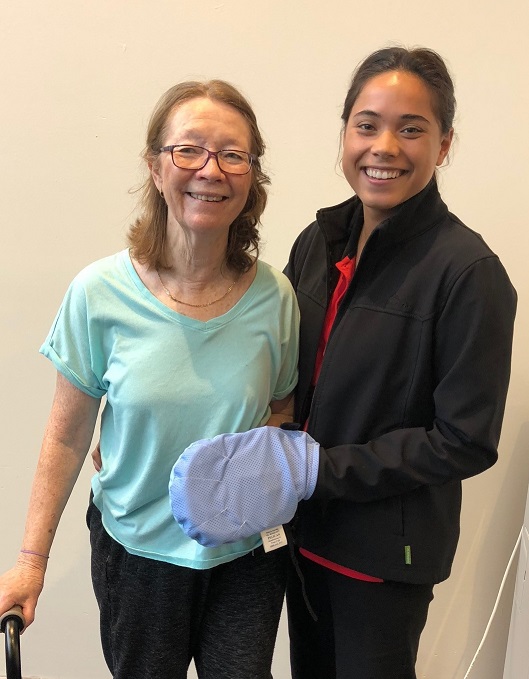This is for POWH Aged care and Rehabilitation
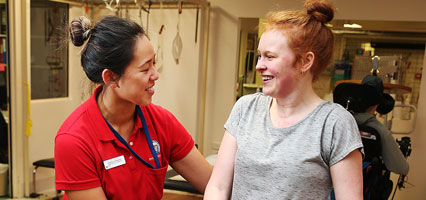
Constraint Induced Movement Therapy (CIMT)
|
Constraint Induced Movement Therapy (CIMT) is a therapy program that can be used to improve the strength, use and function of a weak arm and hand following a stroke or acquired brain injury. It is an intensive program that will be run over a 2 week clinic at Prince of Wales Hospital, St George Hospital and Sutherland Hospital each year. It involves the encouragement of use of the weak (or affected arm) and restraint of the strong (or unaffected arm). Participants will be required to participate in 4 hours of therapy per day, with an additional 1 hour of homework and commit to wearing the restraint (in the form of a soft mitt) for most of the day. Though intensive, the results for the right people are better than usual therapy, and have strong supporting evidence from the 2017 Clinical Guidelines for Stroke Management (National Stroke Foundation Australia). Participants must have some movement in their wrist and fingers and be able to consent to the program. |
|
Please click on the box which best describes you:
I am a stroke survivor or carer |
I am a health professional |
I want to make a referral |
I want to contact you |

St George Hospital, Gray Street, Kogarah, 2217
Sutherland Hospital, The Kingsway, Caringbah, 2229
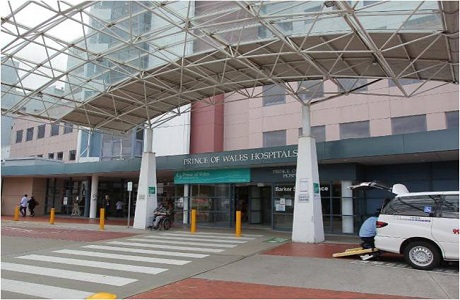
Spinal Injuries Unit - Outpatient Clinics
How we can help you
We are only one of two units in New South Wales providing care for people with spinal cord injuries. We strive to make sure our patients are empowered to achieve their maximum possible level of independence and quality of life. Our aim is that all patients and their carers feel informed and confident about treatment options and are actively involved in planning their care.
We have an acute inpatient ward and rehabilitation inpatient ward.
After leaving hospital our unit will continue to provide support through your local general practitioner (GP) and through our our outpatient clinics.
We will support you with:
- Respiratory problems
- Bladder and bowel management
- Skin pressure wounds
- Deep vein thrombosis (clots)
- Pain management
- Spasticity
- Changes is sexual function
- Mental health
Our outpatient clinics include:
|
Service |
What we do |
Clinic times |
|
Spinal outpatient clinic/ Telehealth clinic |
Medical review |
|
|
Spinal pressure care clinic |
Multi-disciplinary clinic for patients with pressure areas after spinal cord injury |
Weekly |
|
Spinal multidisciplinary clinic |
Spinal Specialist, Physiotherapist and Occupational Therapist |
Fortnightly |
|
Spasticity clinic |
Spinal Medical Specialist, Physiotherapist and Occupational Therapist |
Weekly |
|
Liaison psychiatry spinal clinic |
Mental health review |
Fortnightly |
|
Pain clinic |
Medical Specialist; and a multidisciplinary team as required |
|
|
Seating Clinic |
Seating Clinic is a joint service between Occupational Therapy & Rehabilitation Engineering. We work with people who are reliant on a wheelchair to determine the most appropriate wheelchair, cushion and backrest for their needs. We provide advice regarding pressure injury management (in relation to wheelchairs and shower commodes) as well as managing postural changes that arise. To access the Seating Clinic, you must be under the care of a POWH clinician. Contact details: SESLHD-RehabEng@health.nsw.gov.au |
Mon - Fri (by appointment) |
Manager
Director Dr Sachin Shetty
Learn about our electronic referral system
How to find us
Dept of Spinal and Rehabilitation Medicine, Level 2, High St building, Prince of Wales Hospital (Building 2 on our campus map)
Some of our clinics are located in our Outpatient Department, Level 2 , Campus Centre, Prince of Wales Hospital (Building 16 on our campus map)
Our team includes:
- Medical staff
- Nursing staff
- Physiotherapists
- Occupational therapists
- Dietician
- Speech Therapists
- Social workers
- Psychologist
- Orthotists
You are the central member of your health care team. We will work together with you to set your individual goals and enable personalised rehabilitation that maximises your potential and transition back to the community.
You will need a referral letter from your local general practitioner (GP) or specialty doctor to use this service. Your doctor will need to submit this referral electronically via Healthlink. Your referral will include your medical history, relevant test results, X-ray results and what medicines you are currently taking.
Once we receive this referral and accept it we will send you a letter with your appointment details. We will also send this to your doctor. If we cannot make an appointment for you, we will send you a letter confirming that you are on the waiting list for the next available appointment. If you change your address and/or phone number, please call 02 9382 5847, 02 9382 5931 or 02 9382 5163.
If you need to change or cancel your appointment or no longer require an appointment/be on the waitlist, please call 002 9382 5847, 02 9382 5931 or 02 9382 5163.
You will need to bring:
- Medicare card
- Health care card and/or concession card (if you have one)
- Previous xrays, scans, ultrasounds or any other test results
- Your regular medicines and a list of all that you are currently taking (or the boxes), including those you take without a prescription such as herbal supplements or vitamins
- Glasses, hearing aid, walking frame.
- Your referral from your GP (local doctor) is essential.
When you come to our hospital for your appointment, you can check-in using our electronic check-in kiosks. These are located in our Adult Outpatient Department, Acute Services Building (Botany Street), High Street and Barker Street entrances.
Please let us know if you need an interpreter before your appointment date. You can contact us telephoning the Translating and Interpreting Service (TIS) on 131 450. Tell the operator what language you speak and then ask the interpreter to set up a telephone conversation between you, an interpreter, and call 02 9382 5847, 02 9382 5931 or 02 9382 5163.
Spinal Injuries Unit - Outpatient Clinics
How we can help you
We are only one of two units in New South Wales providing care for people with spinal cord injuries. We strive to make sure our patients are empowered to achieve their maximum possible level of independence and quality of life. Our aim is that all patients and their carers feel informed and confident about treatment options and are actively involved in planning their care.
We have an acute inpatient ward and rehabilitation inpatient ward.
After leaving hospital our unit will continue to provide support through your local general practitioner (GP) and through our our outpatient clinics.
We will support you with:
- Respiratory problems
- Bladder and bowel management
- Skin pressure wounds
- Deep vein thrombosis (clots)
- Pain management
- Spasticity
- Changes is sexual function
- Mental health
Our outpatient clinics include:
|
Service |
What we do |
Clinic times |
|
Spinal outpatient clinic/ Telehealth clinic |
Medical review |
|
|
Spinal pressure care clinic |
Multi-disciplinary clinic for patients with pressure areas after spinal cord injury |
Weekly |
|
Spinal multidisciplinary clinic |
Spinal Specialist, Physiotherapist and Occupational Therapist |
Fortnightly |
|
Spasticity clinic |
Spinal Medical Specialist, Physiotherapist and Occupational Therapist |
Weekly |
|
Liaison psychiatry spinal clinic |
Mental health review |
Fortnightly |
|
Pain clinic |
Medical Specialist; and a multidisciplinary team as required |
|
|
Seating Clinic |
Seating Clinic is a joint service between Occupational Therapy & Rehabilitation Engineering. We work with people who are reliant on a wheelchair to determine the most appropriate wheelchair, cushion and backrest for their needs. We provide advice regarding pressure injury management (in relation to wheelchairs and shower commodes) as well as managing postural changes that arise. To access the Seating Clinic, you must be under the care of a POWH clinician. Contact details: SESLHD-RehabEng@health.nsw.gov.au |
Mon - Fri (by appointment) |
Manager
Director Dr Sachin Shetty
Learn about our electronic referral system
How to find us
Dept of Spinal and Rehabilitation Medicine, Level 2, High St building, Prince of Wales Hospital (Building 2 on our campus map)
Some of our clinics are located in our Outpatient Department, Level 2 , Campus Centre, Prince of Wales Hospital (Building 16 on our campus map)
Our team includes:
- Medical staff
- Nursing staff
- Physiotherapists
- Occupational therapists
- Dietician
- Speech Therapists
- Social workers
- Psychologist
- Orthotists
You are the central member of your health care team. We will work together with you to set your individual goals and enable personalised rehabilitation that maximises your potential and transition back to the community.
You will need a referral letter from your local general practitioner (GP) or specialty doctor to use this service. Your doctor will need to submit this referral electronically via Healthlink. Your referral will include your medical history, relevant test results, X-ray results and what medicines you are currently taking.
Once we receive this referral and accept it we will send you a letter with your appointment details. We will also send this to your doctor. If we cannot make an appointment for you, we will send you a letter confirming that you are on the waiting list for the next available appointment. If you change your address and/or phone number, please call 02 9382 5847, 02 9382 5931 or 02 9382 5163.
If you need to change or cancel your appointment or no longer require an appointment/be on the waitlist, please call 002 9382 5847, 02 9382 5931 or 02 9382 5163.
You will need to bring:
- Medicare card
- Health care card and/or concession card (if you have one)
- Previous xrays, scans, ultrasounds or any other test results
- Your regular medicines and a list of all that you are currently taking (or the boxes), including those you take without a prescription such as herbal supplements or vitamins
- Glasses, hearing aid, walking frame.
- Your referral from your GP (local doctor) is essential.
When you come to our hospital for your appointment, you can check-in using our electronic check-in kiosks. These are located in our Adult Outpatient Department, Acute Services Building (Botany Street), High Street and Barker Street entrances.
Please let us know if you need an interpreter before your appointment date. You can contact us telephoning the Translating and Interpreting Service (TIS) on 131 450. Tell the operator what language you speak and then ask the interpreter to set up a telephone conversation between you, an interpreter, and call 02 9382 5847, 02 9382 5931 or 02 9382 5163.
Rehabilitation Ward (General Rehabilitation - Parkes 1 West)
How we can help you
If you have had an illness or injury, we will help you set goals and work with you to regain function, independence and wellbeing.
Our therapies include: psychology, hydrotherapy, physiotherapy, occupational therapy, speech pathology, social work, dietetics and podiatry.
Manager
Nursing Unit Manager Melissa Cooper
How to find us
Level 1, Ward West, Parkes Building, High Street entrance, Prince of Wales Hospital (Building 7 on our campus map)
Information about how to get to our Randwick campus
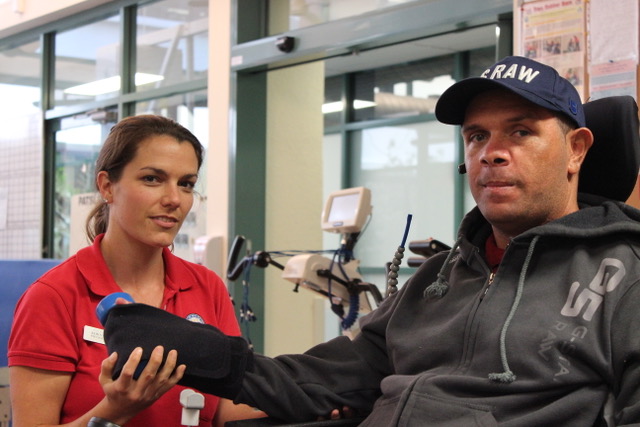
We care for people who want to recover function or independence after a:
- Stroke
- Neurological condition such as cerebral aneurysm, multiple sclerosis, parkinson’s disease, neuropathy or polio
- Arm or leg amputation
- Bone, muscle or joint problem
- Spinal injury
- Period in hospital where they have lost some function or ability.
Our team includes:
- Medical staff
- Nursing staff
- Physiotherapists
- Occupational therapists
- Dietician
- Speech Therapists
- Social workers
- Psychologist
- Orthotists
You are the central member of your rehabilitation team. We will work together with you to set your individual goals and enable personalised rehabilitation that maximises your potential and transition back to the community.
We believe research helps us improve what we do and we test and introduce new, proven techniques. You will sometimes be asked whether you wish to participate in research projects. We will always respect your right to decline if you don’t wish to participate.
We are a teaching hospital and have many team members who are trainees. Interns are newly qualified doctors. The registrar looking after you is in training to become a specialist in rehabilitation medicine. The nursing staff will often include students from our affiliated Universities working under supervision, as do our physiotherapy, occupational therapy, social work, speech pathology and dietician staff. Be assured that they are all well-supervised by fully accredited senior staff members.
Even our experienced permanent staff members are committed to continual education to keep up to date and to learn new ways of working and supporting your recovery.
Please let us know if you need an interpreter. You can contact us telephoning the Translating and Interpreting Service (TIS) on 131 450. Tell the operator what language you speak and then ask the interpreter to set up a telephone conversation between you, an interpreter, and the healthcare professional you want to speak with.
Rehabilitation Ward (General Rehabilitation - Parkes 1 West)
How we can help you
If you have had an illness or injury, we will help you set goals and work with you to regain function, independence and wellbeing.
Our therapies include: psychology, hydrotherapy, physiotherapy, occupational therapy, speech pathology, social work, dietetics and podiatry.
Manager
Nursing Unit Manager Melissa Cooper
How to find us
Level 1, Ward West, Parkes Building, High Street entrance, Prince of Wales Hospital (Building 7 on our campus map)
Information about how to get to our Randwick campus

We care for people who want to recover function or independence after a:
- Stroke
- Neurological condition such as cerebral aneurysm, multiple sclerosis, parkinson’s disease, neuropathy or polio
- Arm or leg amputation
- Bone, muscle or joint problem
- Spinal injury
- Period in hospital where they have lost some function or ability.
Our team includes:
- Medical staff
- Nursing staff
- Physiotherapists
- Occupational therapists
- Dietician
- Speech Therapists
- Social workers
- Psychologist
- Orthotists
You are the central member of your rehabilitation team. We will work together with you to set your individual goals and enable personalised rehabilitation that maximises your potential and transition back to the community.
We believe research helps us improve what we do and we test and introduce new, proven techniques. You will sometimes be asked whether you wish to participate in research projects. We will always respect your right to decline if you don’t wish to participate.
We are a teaching hospital and have many team members who are trainees. Interns are newly qualified doctors. The registrar looking after you is in training to become a specialist in rehabilitation medicine. The nursing staff will often include students from our affiliated Universities working under supervision, as do our physiotherapy, occupational therapy, social work, speech pathology and dietician staff. Be assured that they are all well-supervised by fully accredited senior staff members.
Even our experienced permanent staff members are committed to continual education to keep up to date and to learn new ways of working and supporting your recovery.
Please let us know if you need an interpreter. You can contact us telephoning the Translating and Interpreting Service (TIS) on 131 450. Tell the operator what language you speak and then ask the interpreter to set up a telephone conversation between you, an interpreter, and the healthcare professional you want to speak with.
Aged Care Rehabilitation Unit
How we can help you
Our team specialises in the care of older people with complex health needs. We focus on rehabilitation after illness or injury and set goals with you and support you in therapies that improve your function and independence. The aim is for you to return your previous level of ability.
We are located on Level 4 South of the Acute Services Building, Prince of Wales Hospital.
Acute Aged Care Extension Unit (AACE)
Also on Level 4 South is our AACE, a six bed unit specialising in care of older patients with behavioural symptoms related to dementia or delirium. The comfort and wellbeing of these patients is enhanced by the quiet environment provided and the staff with specialised skills.
The AACE is arranged like a home with a communal lounge and access to a safe outdoor area. It is a secure unit and you will need to press the buzzer on the wall just before the unit to alert staff that you have arrived.
Manager
Nurse Unit Manager Jane Bayaca
How to find us
Level 4 South, Acute Services Building, Prince of Wales Hospital (Building 30 on our campus map)
Information about how to get to our Randwick campus
Acute Aged Care Extension Unit (AACE)
Phone
02 9382 9450
How to find us
Level 4 South, Acute Services Building, Prince of Wales Hospital (Building 30 on our campus map)
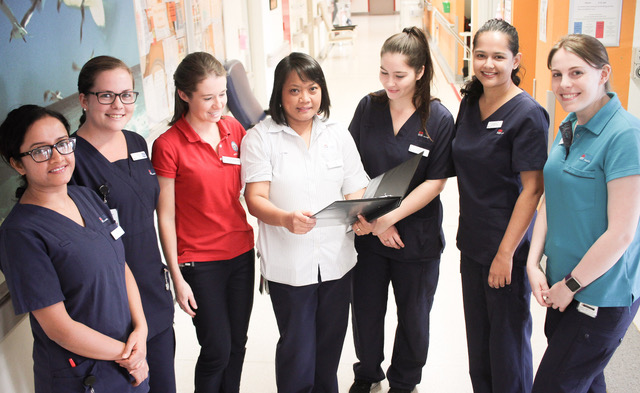
Our team includes doctors, nurses and allied health staff who work together with you, your family and carer to meet your physical, mental and emotional needs while you are in hospital and to begin planning for when you leave hospital.
ReVive Program Volunteers
Our volunteers receive 12 hours of training to provide support, companionship and practical assistance to patients, particularly those who are feeling confused, are at risk of falling or are losing some abilities as a result of being in hospital. The volunteers spend time with patients, listening to their stories, talking about things of interest, giving hand massages, encouraging them to eat and drink or helping them walk safely around the ward. If you think your relative might benefit from a visit from a ReViVe volunteer please contact the Aged Care Volunteer Coordinator on 9382 2014.
The aged care wards offer nursing care to patients 24 hours a day, seven days a week. A doctor is always on call. Other members of the team are available from 8am to 5pm, Monday to Friday. Our nurses will try to connect you with other members of staff at your request but, depending on the time and day and the seriousness of the situation, you may have to wait, particularly when it is after hours or on the weekend. We know this can be frustrating, especially if you are worried about your relative, and will do what we can to answer questions in the meantime.
We value your opinions and know that clear communication is essential for your care. If you do not understand anything please ask us:
- Why are you doing that?
- What does that word mean?
- What does that procedure involve?
- What alternatives are there?
- What side-effects might there be?
- How will this help?
When it comes to sharing information with family and friends, it is helpful if one person takes responsibility for asking staff for updates and passing this information on to the others.
What happens if my relative is transferred to another ward in the hospital?
Sometimes, due to bed availability or specific care needs of a patient, patients may be admitted to other wards around the hospital. These patients will still be cared for by the aged care team and will be seen on a regular basis.
We are a teaching hospital and you may be asked to be involved in research or for a student to be present at your appointment. You have a right to say no. If you do so, this will not impact in any way on the services we will provide.
Please let us know if you need an interpreter. You can contact us telephoning the Translating and Interpreting Service (TIS) on 131 450. Tell the operator what language you speak and then ask the interpreter to set up a telephone conversation between you, an interpreter, and the healthcare professional you want to speak with.
Handbook for family and friends of patients admitted to Aged Care Wards
www.myagedcare.gov.au is an Australian Government website and national phone line (1800 200 422) with up-to-date information about Australia’s aged care system and services. It assists people to navigate the aged care system and provides referrals for assessment and service provision
The Aged Care Information Line provides information on home and community care and financial benefits. Telephone 1800 500 853 TTY 1800 555 677
Aged Care Rehabilitation Unit
How we can help you
Our team specialises in the care of older people with complex health needs. We focus on rehabilitation after illness or injury and set goals with you and support you in therapies that improve your function and independence. The aim is for you to return your previous level of ability.
We are located on Level 4 South of the Acute Services Building, Prince of Wales Hospital.
Acute Aged Care Extension Unit (AACE)
Also on Level 4 South is our AACE, a six bed unit specialising in care of older patients with behavioural symptoms related to dementia or delirium. The comfort and wellbeing of these patients is enhanced by the quiet environment provided and the staff with specialised skills.
The AACE is arranged like a home with a communal lounge and access to a safe outdoor area. It is a secure unit and you will need to press the buzzer on the wall just before the unit to alert staff that you have arrived.
Manager
Nurse Unit Manager Jane Bayaca
How to find us
Level 4 South, Acute Services Building, Prince of Wales Hospital (Building 30 on our campus map)
Information about how to get to our Randwick campus
Acute Aged Care Extension Unit (AACE)
Phone
02 9382 9450
How to find us
Level 4 South, Acute Services Building, Prince of Wales Hospital (Building 30 on our campus map)

Our team includes doctors, nurses and allied health staff who work together with you, your family and carer to meet your physical, mental and emotional needs while you are in hospital and to begin planning for when you leave hospital.
ReVive Program Volunteers
Our volunteers receive 12 hours of training to provide support, companionship and practical assistance to patients, particularly those who are feeling confused, are at risk of falling or are losing some abilities as a result of being in hospital. The volunteers spend time with patients, listening to their stories, talking about things of interest, giving hand massages, encouraging them to eat and drink or helping them walk safely around the ward. If you think your relative might benefit from a visit from a ReViVe volunteer please contact the Aged Care Volunteer Coordinator on 9382 2014.
The aged care wards offer nursing care to patients 24 hours a day, seven days a week. A doctor is always on call. Other members of the team are available from 8am to 5pm, Monday to Friday. Our nurses will try to connect you with other members of staff at your request but, depending on the time and day and the seriousness of the situation, you may have to wait, particularly when it is after hours or on the weekend. We know this can be frustrating, especially if you are worried about your relative, and will do what we can to answer questions in the meantime.
We value your opinions and know that clear communication is essential for your care. If you do not understand anything please ask us:
- Why are you doing that?
- What does that word mean?
- What does that procedure involve?
- What alternatives are there?
- What side-effects might there be?
- How will this help?
When it comes to sharing information with family and friends, it is helpful if one person takes responsibility for asking staff for updates and passing this information on to the others.
What happens if my relative is transferred to another ward in the hospital?
Sometimes, due to bed availability or specific care needs of a patient, patients may be admitted to other wards around the hospital. These patients will still be cared for by the aged care team and will be seen on a regular basis.
We are a teaching hospital and you may be asked to be involved in research or for a student to be present at your appointment. You have a right to say no. If you do so, this will not impact in any way on the services we will provide.
Please let us know if you need an interpreter. You can contact us telephoning the Translating and Interpreting Service (TIS) on 131 450. Tell the operator what language you speak and then ask the interpreter to set up a telephone conversation between you, an interpreter, and the healthcare professional you want to speak with.
Handbook for family and friends of patients admitted to Aged Care Wards
www.myagedcare.gov.au is an Australian Government website and national phone line (1800 200 422) with up-to-date information about Australia’s aged care system and services. It assists people to navigate the aged care system and provides referrals for assessment and service provision
The Aged Care Information Line provides information on home and community care and financial benefits. Telephone 1800 500 853 TTY 1800 555 677
Aged Care Rehabilitation Unit
How we can help you
Our team specialises in the care of older people with complex health needs. We focus on rehabilitation after illness or injury and set goals with you and support you in therapies that improve your function and independence. The aim is for you to return your previous level of ability.
We are located on Level 4 South of the Acute Services Building, Prince of Wales Hospital.
Acute Aged Care Extension Unit (AACE)
Also on Level 4 South is our AACE, a six bed unit specialising in care of older patients with behavioural symptoms related to dementia or delirium. The comfort and wellbeing of these patients is enhanced by the quiet environment provided and the staff with specialised skills.
The AACE is arranged like a home with a communal lounge and access to a safe outdoor area. It is a secure unit and you will need to press the buzzer on the wall just before the unit to alert staff that you have arrived.
Manager
Nurse Unit Manager Jane Bayaca
How to find us
Level 4 South, Acute Services Building, Prince of Wales Hospital (Building 30 on our campus map)
Information about how to get to our Randwick campus
Acute Aged Care Extension Unit (AACE)
Phone
02 9382 9450
How to find us
Level 4 South, Acute Services Building, Prince of Wales Hospital (Building 30 on our campus map)

Our team includes doctors, nurses and allied health staff who work together with you, your family and carer to meet your physical, mental and emotional needs while you are in hospital and to begin planning for when you leave hospital.
ReVive Program Volunteers
Our volunteers receive 12 hours of training to provide support, companionship and practical assistance to patients, particularly those who are feeling confused, are at risk of falling or are losing some abilities as a result of being in hospital. The volunteers spend time with patients, listening to their stories, talking about things of interest, giving hand massages, encouraging them to eat and drink or helping them walk safely around the ward. If you think your relative might benefit from a visit from a ReViVe volunteer please contact the Aged Care Volunteer Coordinator on 9382 2014.
The aged care wards offer nursing care to patients 24 hours a day, seven days a week. A doctor is always on call. Other members of the team are available from 8am to 5pm, Monday to Friday. Our nurses will try to connect you with other members of staff at your request but, depending on the time and day and the seriousness of the situation, you may have to wait, particularly when it is after hours or on the weekend. We know this can be frustrating, especially if you are worried about your relative, and will do what we can to answer questions in the meantime.
We value your opinions and know that clear communication is essential for your care. If you do not understand anything please ask us:
- Why are you doing that?
- What does that word mean?
- What does that procedure involve?
- What alternatives are there?
- What side-effects might there be?
- How will this help?
When it comes to sharing information with family and friends, it is helpful if one person takes responsibility for asking staff for updates and passing this information on to the others.
What happens if my relative is transferred to another ward in the hospital?
Sometimes, due to bed availability or specific care needs of a patient, patients may be admitted to other wards around the hospital. These patients will still be cared for by the aged care team and will be seen on a regular basis.
We are a teaching hospital and you may be asked to be involved in research or for a student to be present at your appointment. You have a right to say no. If you do so, this will not impact in any way on the services we will provide.
Please let us know if you need an interpreter. You can contact us telephoning the Translating and Interpreting Service (TIS) on 131 450. Tell the operator what language you speak and then ask the interpreter to set up a telephone conversation between you, an interpreter, and the healthcare professional you want to speak with.
Handbook for family and friends of patients admitted to Aged Care Wards
www.myagedcare.gov.au is an Australian Government website and national phone line (1800 200 422) with up-to-date information about Australia’s aged care system and services. It assists people to navigate the aged care system and provides referrals for assessment and service provision
The Aged Care Information Line provides information on home and community care and financial benefits. Telephone 1800 500 853 TTY 1800 555 677
Heartlink - managing your heart problems at home
How we can help you
Our service cares for people in the community living with a diagnosis of heart failure.
Our specialised nurse (Cardiac Nurse Practitioner) supports patients, their carers and families with the following services:
-
Education on how to manage your heart failure
-
Assessment and care in your home and/or at our heart failure clinic
-
Medicines to treat heart failure and prevent the need for hospital
-
Other relevant services based on your needs.
Service opening hours
Monday to Friday 8:00am - 4:30pm
Direct phone number
Heartlink service Nurse Practitioner
James McVeigh 0421 057 340
Margaret Ryan 0499 753 065
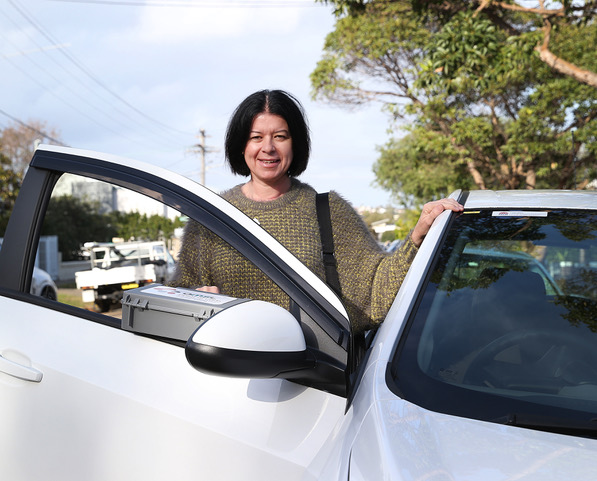
Our team includes two specialist cardiac nurses called Cardiac Nurse Practitioners.
We work with your local doctor (GP), heart doctor (Cardiologist) and other specialist medical physicians, community pharmacists, Prince of Wales hospital community nursing team, the Prince of Wales Community Management Centre to manage your heart failure in the community.
The service provides support to people living with the local catchment area service by the Prince of Wales Hospital within the following suburbs:
Banksmeadow, Beaconsfield, Botany, Chifley, Clovelly, Coogee, Daceyville, Eastlakes, Hillsdale, Kensington, Kingsford, La Perouse, Little Bay, Malabar, Maroubra, Matraville, Mascot, Pagewood, Randwick & Rosebery (South of Gardeners Road)
You will need to contact the Northern Network Access and Referral Centre and make a referral to access this service. Call them on phone: 02 9389 0400.
Once registered with the Heartlink service, you can make an appointment by contacting our nurses on 0421 057 340 or 0499 753 065. Our service operates Monday to Friday, 8.00am - 4.30pm (excluding public holidays).
We are a teaching hospital, and you may be invited to participate in research or for a student to be present at your appointment. You have a right to say no. If you do so, this will not impact in any way on the services we will provide
Please let us know if you need an interpreter. You can contact us telephoning the Translating and Interpreting Service (TIS) National on 131 450. Tell the operator what language you speak and then ask the interpreter to set up a telephone conversation between you, an interpreter, and the healthcare professional you want to speak with.
Heartlink - managing your heart problems at home
How we can help you
Our service cares for people in the community living with a diagnosis of heart failure.
Our specialised nurse (Cardiac Nurse Practitioner) supports patients, their carers and families with the following services:
-
Education on how to manage your heart failure
-
Assessment and care in your home and/or at our heart failure clinic
-
Medicines to treat heart failure and prevent the need for hospital
-
Other relevant services based on your needs.
Service opening hours
Monday to Friday 8:00am - 4:30pm
Direct phone number
Heartlink service Nurse Practitioner
James McVeigh 0421 057 340
Margaret Ryan 0499 753 065

Our team includes two specialist cardiac nurses called Cardiac Nurse Practitioners.
We work with your local doctor (GP), heart doctor (Cardiologist) and other specialist medical physicians, community pharmacists, Prince of Wales hospital community nursing team, the Prince of Wales Community Management Centre to manage your heart failure in the community.
The service provides support to people living with the local catchment area service by the Prince of Wales Hospital within the following suburbs:
Banksmeadow, Beaconsfield, Botany, Chifley, Clovelly, Coogee, Daceyville, Eastlakes, Hillsdale, Kensington, Kingsford, La Perouse, Little Bay, Malabar, Maroubra, Matraville, Mascot, Pagewood, Randwick & Rosebery (South of Gardeners Road)
You will need to contact the Northern Network Access and Referral Centre and make a referral to access this service. Call them on phone: 02 9389 0400.
Once registered with the Heartlink service, you can make an appointment by contacting our nurses on 0421 057 340 or 0499 753 065. Our service operates Monday to Friday, 8.00am - 4.30pm (excluding public holidays).
We are a teaching hospital, and you may be invited to participate in research or for a student to be present at your appointment. You have a right to say no. If you do so, this will not impact in any way on the services we will provide
Please let us know if you need an interpreter. You can contact us telephoning the Translating and Interpreting Service (TIS) National on 131 450. Tell the operator what language you speak and then ask the interpreter to set up a telephone conversation between you, an interpreter, and the healthcare professional you want to speak with.
